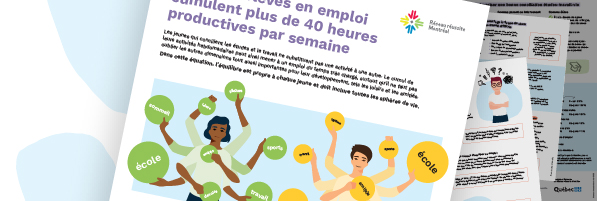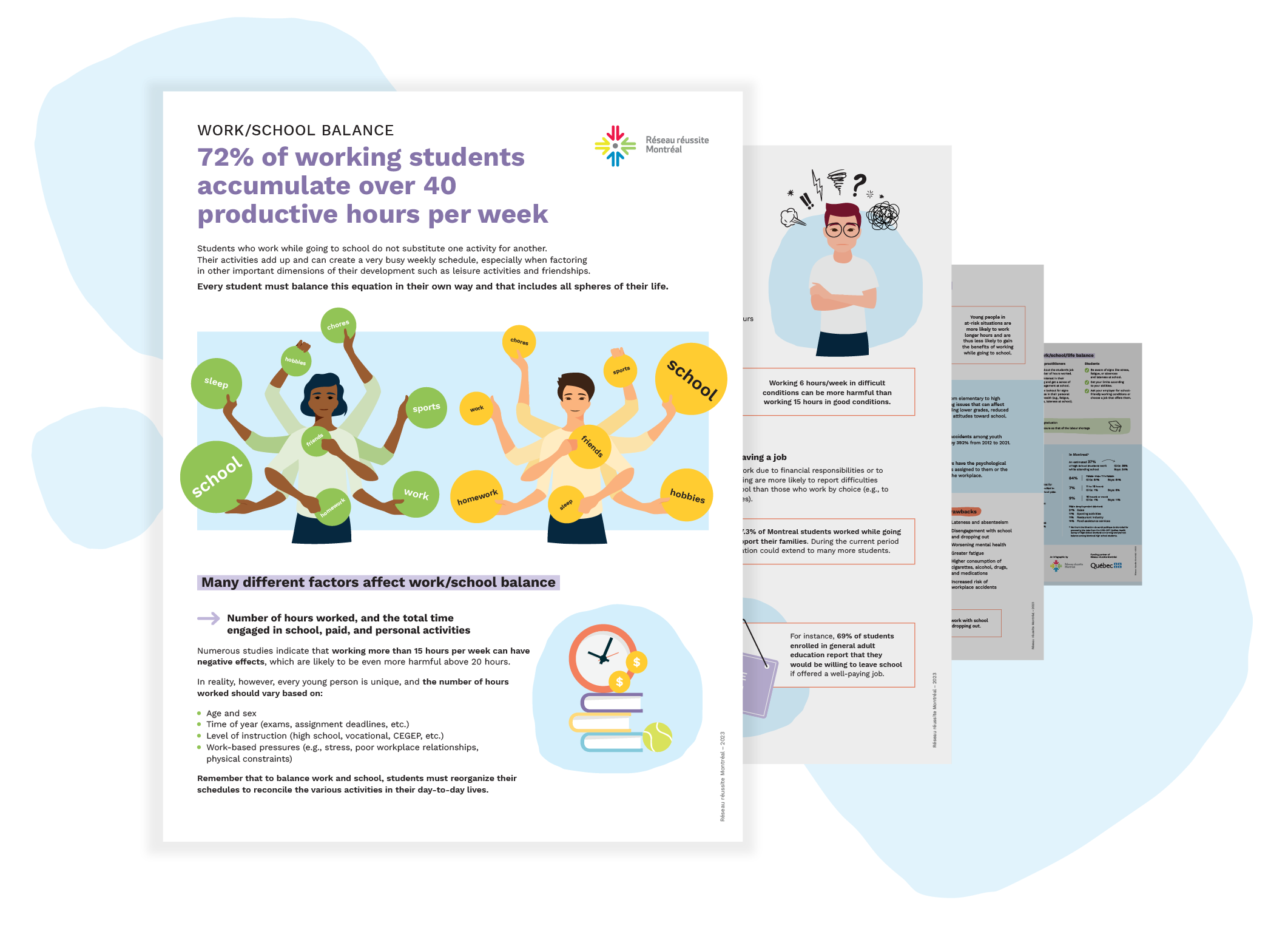This content is only available in French. Please see the French version of this page.
All posts by Maude Furic
Elementary–Secondary Education Survey, 2020/2021
Title: Elementary–Secondary Education Survey, 2020/2021
Author: Statistics Canada
Publisher: Statistics Canada
Year: 2022
Format: Website
Description:
The most recent 2020–2021 Elementary-Secondary Education Survey (ESES) from Statistics Canada highlights the pandemic’s effects on education. Notably, it shows a 106% increase in homeschooling, especially among younger students, along with a slightly higher high school graduation rate (+0.5%). Every year, ESES assembles data on public and private schools across Canada.
Work/school balance: 72% of working students accumulate over 40 productive hours per week
Title: Work/school balance: 72% of working students accumulate over 40 productive hours per week
Author: Réseau réussite Montréal
Publisher: Réseau réussite Montréal
Year: 2023
Format: PDF
Description:
The labour shortage and the marked increase of young people on the job market have thrust the issue of work/school balance to the forefront of our concerns.
To provide information on this topic, Réseau réussite Montréal has produced an information sheet highlighting the key concepts necessary for working students to be successful at school.
Document: Work/school balance: 72% of working students accumulate over 40 productive hours per week

[Infographic] Work/school balance
The labour shortage and the marked increase of young people on the job market have thrust the issue of work/school balance to the forefront of our concerns.
To provide information on this topic, Réseau réussite Montréal has produced an information sheet highlighting the key concepts necessary for working students to be successful at school.
This infographic coincides with the tabling of a bill to regulate and limit child labour, and we hope it will contribute to discussions on this topic.
Youth and leisure screen time
Title: Youth and leisure screen time
Author: Réseau réussite Montréal and Jean-François Biron
Publisher: Réseau réussite Montréal
Year: 2022
Format: PDF
Description:
This infographic presents the results of a survey on digital habits conducted during the pandemic by Montréal’s public health department (Direction régionale de santé publique de Montréal) among 700 youth aged 13 to 17. It helps answer questions about hyperconnectivity and its effects. It was based on a presentation given by Jean-François Biron on November 25, 2021 as part of Réseau réussite Montréal’s webinar on screens and teens during the pandemic: Écrans et adolescent(e)s en contexte de pandémie.
Estime de soi, sentiment d’autoefficacité et intention de décrocher au collégial
This content is only available in French. Please see the French version of this page.
Impact de la pandémie sur la population immigrante
This content is only available in French. Please see the French version of this page.
Temps de rattrapage : L’impact de la pandémie chez les jeunes adultes au Canada
This content is only available in French. Please see the French version of this page.

[Ateliers] Causeries Pratique+
This content is only available in French. Please see the French version of this page.
Returning to Normal? Overcoming Vulnerabilities in an Education System Responding to the COVID-19 Pandemic
Title: Returning to Normal? Overcoming Vulnerabilities in an Education System Responding to the COVID-19 Pandemic (Report on the State and Needs of Education 2020-2021) [Summary]
Author: Conseil supérieur de l’éducation
Publisher: Conseil supérieur de l’éducation
Year: 2021
Format: PDF
Description:
« The Conseil’s full Report on the State and Needs of Education entitled Revenir à la normale? Surmonter les vulnérabilités du système éducatif face à la pandémie de COVID-19 [Returning to Normal? Overcoming Vulnerabilities in an Education System Responding to the COVID-19 Pandemic] begins with a brief overview of existing research on the effects of past pandemics and other causes of disruptions to the normal school year that could shed light on the current one. It then presents an analytical framework to examine the education system’s response to the pandemic and its impacts using crisis management theory and the construct of resilience. The latter demonstrate that knowing where vulnerabilities lie is key for an organization’s ability to adapt and be resilient when faced with adversity. A cross reference of the statements submitted by the organizations with the Conseil’s own published opinions forms the core of the report, uncovering not only the vulnerabilities in the education system, but any lessons that can be drawn to minimize them. The Conseil then concludes by proposing three broad guidelines that could steer several courses of action to swiftly address the negative impacts of the pandemic on education in Québec and make the education system more resilient over the long term. » (Excerpt from the summary)


